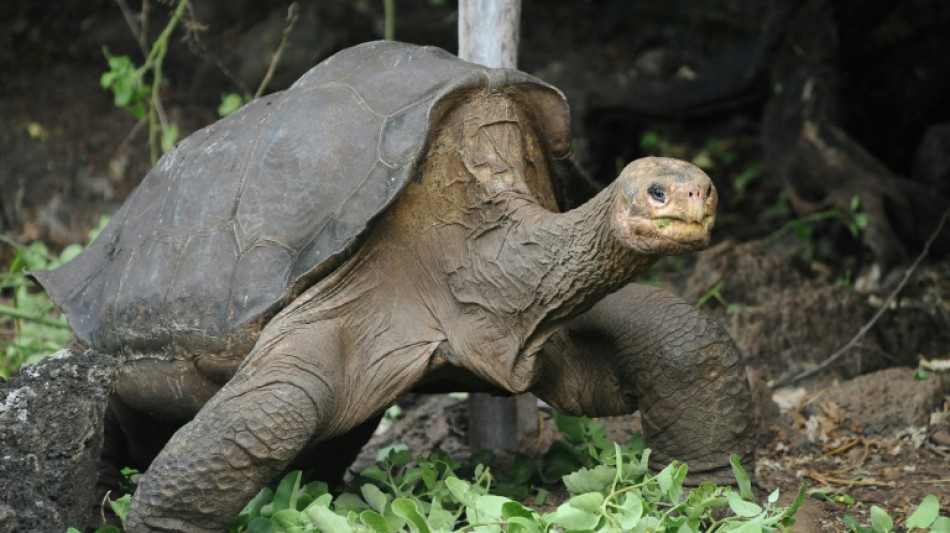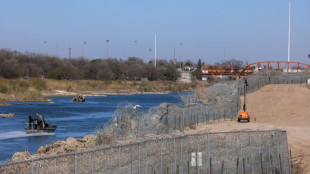
-
 Mbappe can be Real Madrid 'legend' like Ronaldo: Ancelotti
Mbappe can be Real Madrid 'legend' like Ronaldo: Ancelotti
-
Saka 'ready to go' for Arsenal after long injury lay-off: Arteta

-
 Aston Martin to sell stake in Formula One team
Aston Martin to sell stake in Formula One team
-
Three talking points ahead of clay-court season

-
 French court hands Le Pen five-year election ban
French court hands Le Pen five-year election ban
-
Probe accuses ex J-pop star Nakai of sexual assault

-
 Japan leads hefty global stock market losses on tariff woes
Japan leads hefty global stock market losses on tariff woes
-
Saka 'ready to go' after long injury lay-off: Arteta

-
 Ingebrigtsen Sr, on trial for abusing Olympic champion, says he was 'overly protective'
Ingebrigtsen Sr, on trial for abusing Olympic champion, says he was 'overly protective'
-
Tourists and locals enjoy 'ephemeral' Tokyo cherry blossoms

-
 Khamenei warns of 'strong' response if Iran attacked
Khamenei warns of 'strong' response if Iran attacked
-
France fines Apple 150 million euros over privacy feature

-
 UK PM urges nations to smash migrant smuggling gangs 'once and for all'
UK PM urges nations to smash migrant smuggling gangs 'once and for all'
-
Thai authorities probe collapse at quake-hit construction site

-
 France's Le Pen convicted in fake jobs trial
France's Le Pen convicted in fake jobs trial
-
Chinese tech giant Huawei says profits fell 28% last year

-
 Trump says confident of TikTok deal before deadline
Trump says confident of TikTok deal before deadline
-
Myanmar declares week of mourning as hopes fade for quake survivors

-
 Japan's Nikkei leads hefty market losses, gold hits record
Japan's Nikkei leads hefty market losses, gold hits record
-
Tears in Taiwan for relatives hit by Myanmar quake

-
 Venezuela says US revoked transnational oil, gas company licenses
Venezuela says US revoked transnational oil, gas company licenses
-
'Devastated': Relatives await news from Bangkok building collapse

-
 Arsenal, Tottenham to play pre-season North London derby in Hong Kong
Arsenal, Tottenham to play pre-season North London derby in Hong Kong
-
Japan's Nikkei leads hefty equity market losses; gold hits record

-
 Israel's Netanyahu picks new security chief, defying legal challenge
Israel's Netanyahu picks new security chief, defying legal challenge
-
Trump says US tariffs to hit 'all countries'

-
 Prayers and tears for Eid in quake-hit Mandalay
Prayers and tears for Eid in quake-hit Mandalay
-
After flops, movie industry targets fresh start at CinemaCon

-
 Tsunoda targets podium finish in Japan after 'unreal' Red Bull move
Tsunoda targets podium finish in Japan after 'unreal' Red Bull move
-
French chefs await new Michelin guide

-
 UK imposes travel permit on Europeans from Wednesday
UK imposes travel permit on Europeans from Wednesday
-
At his academy, Romanian legend Hagi shapes future champions

-
 Referee's lunch break saved Miami winner Mensik from early exit
Referee's lunch break saved Miami winner Mensik from early exit
-
Djokovic refuses to discuss eye ailment after shock Miami loss

-
 Mitchell magic as Cavs bag 60th win, Pistons and T'Wolves brawl
Mitchell magic as Cavs bag 60th win, Pistons and T'Wolves brawl
-
Mensik shocks Djokovic to win Miami Open

-
 Duterte lawyer: 'compelling' grounds to throw case out
Duterte lawyer: 'compelling' grounds to throw case out
-
What happens on Trump's 'Liberation Day' and beyond?

-
 Clock ticks on Trump's reciprocal tariffs as countries seek reprieve
Clock ticks on Trump's reciprocal tariffs as countries seek reprieve
-
Japan-Australia flagship hydrogen project stumbles

-
 Musk deploys wealth in bid to swing Wisconsin court vote
Musk deploys wealth in bid to swing Wisconsin court vote
-
Mensik upsets Djokovic to win Miami Open

-
 China manufacturing activity grows at highest rate in a year
China manufacturing activity grows at highest rate in a year
-
'Waited for death': Ex-detainees recount horrors of Sudan's RSF prisons

-
 Japan's Nikkei leads big losses in Asian markets as gold hits record
Japan's Nikkei leads big losses in Asian markets as gold hits record
-
Rescue hopes fading three days after deadly Myanmar quake

-
 'Basketbrawl' as seven ejected in Pistons-Wolves clash
'Basketbrawl' as seven ejected in Pistons-Wolves clash
-
Four men loom large in Microsoft history

-
 Computer pioneer Microsoft turns 50 in the age of AI
Computer pioneer Microsoft turns 50 in the age of AI
-
Trump calls out both Putin and Zelensky over ceasefire talks


Extinct-in-the-wild species in conservation limbo
For species classified as "extinct in the wild", the zoos and botanical gardens where their fates hang by a thread are as often anterooms to oblivion as gateways to recovery, new research has shown.
Re-wilding what are often single-digit populations faces the same challenges that pushed these species to the cusp of extinction in the first place, including a lack of genetic diversity. But without conservation efforts, experts say, chances of these species surviving would be even smaller.
Since 1950, nearly 100 animal and plant species vanquished from nature by hunting, pollution, deforestation, invasive lifeforms and other drivers of extinction have been put into critical care by scientists and conservationists, according to the findings.
While the category "extinct in the wild" was not added to the benchmark Red List of Threatened Species until 1994, the term could have applied to all of them.
Of these species teetering on the edge, 12 have been reintroduced to some degree back into the wild, according to a pair of studies published last week in the journals Science and Diversity.
Another 11, however, have gone the way of dinos, dodos and dozens of Pacific island trees, whose delicate flowers will never again grace the planet.
Biodiversity loss has reached crisis proportions not seen since an errant asteroid as big across as Paris smashed into Earth 66 million years ago, wiping out land dinosaurs and ending the Cretaceous period.
That was one of five so-called mass extinction events over the last half-billion years.
Scientists say human activity has pushed Earth into the sixth, with species disappearing 100 to 1,000 times more quickly than normal.
"Real opportunities to prevent extinction and return previously lost species to the wild abound and we must take them," the international team of 15 authors said.
"We have lost 11 species entirely under our care to extinction since 1950."
- Success stories -
Another study published last week in Current Biology -- looking at the "Great Dying" event 252 million years ago that annihilated 95 percent of life on Earth -- showed that accelerated species loss preceded broader ecological collapse.
"Currently, we may be losing species at a faster rate than in any of Earth's past extinctions," lead author Yuangeng Huang, a researcher at the China University of Geosciences, told AFP.
"We cannot predict the tipping point that will send ecosystems into a total collapse but it is an inevitable outcome if we do not reverse biodiversity loss."
Recent conservation success stories -- some of them heroic -- include the European bison, which once roamed across Europe.
By the 1920s their numbers were so reduced that surviving specimens were rounded up into zoos and a breeding programme was launched in Poland.
After reintroduction into the wild in 1952, the broad-shouldered beasts thrived and are no longer considered threatened with extinction by the Internation Union for the Conservation of Nature (IUCN), the keepers of the Red List.
Red wolves in North America, wild horses in central Asia and the desert-dwelling Arabian oryx have all staged comebacks with a helping human hand.
So has the largest land tortoise in the world, native to Espanola Island in the Galapagos.
By the 1970s, Chelonoidis hoodensis had been eaten to the brink. Fourteen surviving individuals were removed and relocated decades later to another island, where their numbers are increasing.
- 'Overlooked category' -
Giant Pinta tortoises on a neighbouring Galapagos island -- one of the 11 extinct-in-the-wild species that didn't make it -- were not so lucky.
After living for half a century as his species' sole survivor, a 75-kilogramme (165-pound) male known as Lonesome George died in 2012.
Other creatures that never made it out of intensive care include Hawaii's black-faced honey creeper, a petite bird devastated by mosquito-borne avian malaria last seen in 2004; Mexico's freshwater Catarina pupfish, unsuccessfully relocated to captivity when its native habitat dried out due to groundwater extraction; and five types of snail on the Society Islands that fell victim to an invasive carnivorous cousin.
Surprisingly, the studies show that species surviving only in controlled environments are in a kind of conservation limbo.
"This is an overlooked category," the researchers noted.
"Despite being considered most at risk, extinct-in-the-wild species are not assessed under the Red List process."
"We have largely ignored the extent of, and the variation in, extinction risk of the very group of species for which humans are most responsible," they added.
Of the 84 species currently with this status, nearly half have not benefitted from attempts to reintroduce them into the wild. Most are plants, suggesting a possible bias towards reintroducing animals that might not be entirely scientifically justified.
At its most recent World Conservation Congress in 2020, the IUCN called for the reestablishment of extinct-in-the-wild species in the wild by 2030.
P.Martin--AMWN



